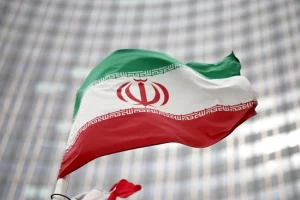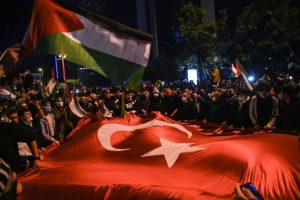The Role of Islam in Foreign Policymaking – Part III
Emir Hadzikadunic || 17 April 2022
Domestic level and Islamic related constraints on foreign policymaking
 In addition to their individualities, leaders almost always face domestic constraints on foreign policymaking.[1]At this level, it is largely about two theoretical frameworks. On one side, it is about domestically shared ideas, beliefs and identities which is more related to constructivist approach in IR. On the other, it brings common ideology, interests and institutions into foreign policy analysis which is more related to liberalism. In this paper, it seems appropriate to limit its scope and delve into the pressures placed by: (1) attributes embedded in shared Islamic symbols, principles, or norms on one hand and (2) Islamic ideas, interests and institutions from local Islamic organizations, parties, and pressure groups with access to policymakers on the other.
In addition to their individualities, leaders almost always face domestic constraints on foreign policymaking.[1]At this level, it is largely about two theoretical frameworks. On one side, it is about domestically shared ideas, beliefs and identities which is more related to constructivist approach in IR. On the other, it brings common ideology, interests and institutions into foreign policy analysis which is more related to liberalism. In this paper, it seems appropriate to limit its scope and delve into the pressures placed by: (1) attributes embedded in shared Islamic symbols, principles, or norms on one hand and (2) Islamic ideas, interests and institutions from local Islamic organizations, parties, and pressure groups with access to policymakers on the other.
Following the 1979 Islamic Revolution in Iran, virtually all of the domestic attributes that theorists argue are important in foreign policy formulation changed radically, in particular the ideology which affects values and objectives, the institutions which develop and implement foreign policies, and the political elite with new conceptions of national goals and interests.[2] Such radical domestic change in any given state is also expected to alter conditions outside of it territorial sovereign boundaries, such as Islamic Republic of Iran did in 1979 in relations to systemic powers of the US and Soviet Union and regional powers in the neighborhood for which reason that year was marked as a turning point in the history of Islam and international relations.
Constructivist scholars from IR have been the main proponents of collective ideas and norms as sources of influence. Furthermore, these ideas and norms construct identities and interests and eventually shape foreign policy preference. Islamic religion embedded in a country’s national identity is quite compatible with these propositions. For example, in a typical theocratic state, such as Saudi Arabia, Islam is acted as the faith of citizens. This faith reflects their collective Islamic identity that according to constructivist approach is expected to result in specific foreign policy preference. Saudi Arabia is also “a state of monarchy operating in a system that integrates politics with religion, where there is no constitution, no political party, and no secular legal system.”[3] Speaking of principles and orientations in its foreign policy, the fundamental objective appears to carry forward the “orthodoxy” of Islam, achieve its national interests through Islam, and even consolidate its status as a leader of faith in the Islamic world.[4] In one of his public speeches, King Faisal emphasized Saudi foreign policy as being based on religious doctrine: “The affair of Israel and usurped Palestine is neither political nor economic. It is an affair putting in question the basics of Islam.”[5] These foreign policy orientations were also the guides for specific foreign policy actions however limited they were. In some cases, Saudi Arabia spent its financial resources and used its political leverage to defend the rights of Islamic faith, and protect the interests, dignity, and national rights of Muslim majorities or minorities in countries that were occupied or exposed to external powers, such as those in Palestine or Bosnia and Herzegovina. For example, Saudi Arabia has at numerous occasions offered its good offices to help mediate the PLO-Hamas divide.
 At the same time, Saudi dependency on the US for security reasons was deemed un-Islamic and occasionally challenged domestically by dissidents, clergy and religious scholars. This is another example how their shared ideas and beliefs impact Saudi foreign policy preference, however limited their success might be. In September 1992, over 100 members of religious and political opposition groups jointly presented a “memorandum of expostulation,” which described their viewpoints over Saudi Arabian foreign policies since the beginning of the Gulf War. They also requested that the Saudi Arabian royal family should listen to commoners’ opinions and suggestions and avoid the political alliance with the US that according to them violated the religious law of Islam.[6] In light of these pressures, the Saudi government has tended to separate foreign policy from domestic policy. At home, it would maintain a harder line on issues like the Arab-Israeli conflict and solidifying the unity of the Muslim umma.[7] In the international arena, it could slightly adjust its behavior from time to time. One such example was the bilateral agreement with the US to retreat its air force from Saudi Arabian airbases after 9/11.[8] The story becomes even more complicated when the domestic context pushes Saudi Arabia to act as a defense wall of Sunni Muslims in the Middle East or Central Asia region against the surging expansion of Shia-dominated Iran. In this respect, the thin line that separates Islamic from sectarian constraints becomes even thinner.
At the same time, Saudi dependency on the US for security reasons was deemed un-Islamic and occasionally challenged domestically by dissidents, clergy and religious scholars. This is another example how their shared ideas and beliefs impact Saudi foreign policy preference, however limited their success might be. In September 1992, over 100 members of religious and political opposition groups jointly presented a “memorandum of expostulation,” which described their viewpoints over Saudi Arabian foreign policies since the beginning of the Gulf War. They also requested that the Saudi Arabian royal family should listen to commoners’ opinions and suggestions and avoid the political alliance with the US that according to them violated the religious law of Islam.[6] In light of these pressures, the Saudi government has tended to separate foreign policy from domestic policy. At home, it would maintain a harder line on issues like the Arab-Israeli conflict and solidifying the unity of the Muslim umma.[7] In the international arena, it could slightly adjust its behavior from time to time. One such example was the bilateral agreement with the US to retreat its air force from Saudi Arabian airbases after 9/11.[8] The story becomes even more complicated when the domestic context pushes Saudi Arabia to act as a defense wall of Sunni Muslims in the Middle East or Central Asia region against the surging expansion of Shia-dominated Iran. In this respect, the thin line that separates Islamic from sectarian constraints becomes even thinner.
If the state’s identity has been defined as strictly Islamic, as in Iran after the 1979, it is likely that religious factors will strongly affect its foreign policy. The Islamic Republic of Iran also changed the focus of diplomacy after Islamic revolution to emphasize the religious dimensions that remain largely alien to the international community.[9] As Douglas Johnston notes, the world came suddenly “face to face” with religion as the missing and (often) ignored dimension of statecraft.[10] Various other authors also discussed new normative doctrines that originated in the Iranian/Islamic revolution. First, the constitution of 1979 granted supremacy to the supreme leader based on Khomeini’s principle of the velayat-e faqih. Under this principle, the supreme leader is the ultimate authority and the earthly trustee of the Shia “Hidden Imam” until the latter’s reappearance near the Day of Judgment.[11] Second, the Preamble of the 1979 Constitution of the IRI declared other essential but contentious elements:
“With due considerations to the Islamic content of the Iranian revolution, which was a movement for the victory of all the oppressed people over their oppressors, the Constitution paves the way for the perpetuation of this Revolution in and outside of the country, particularly in the area of expansion of international relations with other Islamic and peoples’ movements; it tries to prepare the ground for the creation of a single world community and the perpetuation of the struggle for delivering all the deprived and oppressed nations of the world”.
 Article 152 of the Iranian Constitution also underlines the foreign policy based on “defense of the rights of all Muslims.” While it refrains from the interference in internal matters of other nations in Article 154, it supports the just struggles of the Mustad’afīn (oppressed) against the Mustakbirīn (oppressors) in any corner of the world.[12] In light of these principles, it is easier to understand Iran’s foreign policy commitments and behaviour. Amir M. Haji-Yousefi found their impact on Iran’s external relations in the realm of goals and strategies.[13] Iranian negotiating approach becomes also faith-based according to Landsberg and Solomonn. It focuses on religious methods that are traditionally an inherent part of Twelver Shı¯’ism, namely taqiyyah[14], tanfih[15], and khod’eh.[16] Anoushiravan Ehteshami and Mahjoob Zweiri speak of Iran’s support for Islamic resistance and undertakings to portray itself as the heart of the Muslim world.[17] However, critical voices would link these doctrines with threatening and contentious activities - that is the export of the Iranian revolution to other Muslim countries in the region, at least in the initial stage. According to James H. Kruse Iran sought to expand its revolution to neighboring states and encouraged the “oppressed peoples” to rise up against their “corrupt illegitimate governments.”[18] Noof Rashid ALDosari links Preamble from the Iranian Constitution with global aspirations of the Iranian state that advocates a single world community ruled by the Supreme Leader. As he argued, it offered Iranian Islamic imperialism against Western imperialism.[19] Rakel highlighted a dilemma in the Iranian geopolitical culture of whether the Iranians should identify with: the ummah (Islamic community), as was proclaimed by Ayatollah Khomeini; or with Iran as a nation-state, as former Presidents Rafsanjani and Khatami see it.[20] Roger M. Savory viewed that new ideology was employed to generate political activism in foreign affairs. It was also employed as the basis for attempts to subvert the governments of other states. Countries from the region soon realized that the ideology of the Islamic Revolutionary Movement which had brought Khomeini to power had an external as well as an internal dimension.[21]
Article 152 of the Iranian Constitution also underlines the foreign policy based on “defense of the rights of all Muslims.” While it refrains from the interference in internal matters of other nations in Article 154, it supports the just struggles of the Mustad’afīn (oppressed) against the Mustakbirīn (oppressors) in any corner of the world.[12] In light of these principles, it is easier to understand Iran’s foreign policy commitments and behaviour. Amir M. Haji-Yousefi found their impact on Iran’s external relations in the realm of goals and strategies.[13] Iranian negotiating approach becomes also faith-based according to Landsberg and Solomonn. It focuses on religious methods that are traditionally an inherent part of Twelver Shı¯’ism, namely taqiyyah[14], tanfih[15], and khod’eh.[16] Anoushiravan Ehteshami and Mahjoob Zweiri speak of Iran’s support for Islamic resistance and undertakings to portray itself as the heart of the Muslim world.[17] However, critical voices would link these doctrines with threatening and contentious activities - that is the export of the Iranian revolution to other Muslim countries in the region, at least in the initial stage. According to James H. Kruse Iran sought to expand its revolution to neighboring states and encouraged the “oppressed peoples” to rise up against their “corrupt illegitimate governments.”[18] Noof Rashid ALDosari links Preamble from the Iranian Constitution with global aspirations of the Iranian state that advocates a single world community ruled by the Supreme Leader. As he argued, it offered Iranian Islamic imperialism against Western imperialism.[19] Rakel highlighted a dilemma in the Iranian geopolitical culture of whether the Iranians should identify with: the ummah (Islamic community), as was proclaimed by Ayatollah Khomeini; or with Iran as a nation-state, as former Presidents Rafsanjani and Khatami see it.[20] Roger M. Savory viewed that new ideology was employed to generate political activism in foreign affairs. It was also employed as the basis for attempts to subvert the governments of other states. Countries from the region soon realized that the ideology of the Islamic Revolutionary Movement which had brought Khomeini to power had an external as well as an internal dimension.[21]
The second emphasis of this part is on countries in which local Islamic organizations appear to impact foreign policy. They generally carry out social, political and economic functions and in some Muslim-majority societies, they are quite active. Indonesia is again a good reference point. It is also a country where individual and domestic constraints were interacting and reinforcing each other. In addition to the resignation of Suharto in 1998, the Indonesian political system also changed by becoming less authoritarian and more democratic. Islamic political parties and pressure groups were not only mushrooming but also paying a wider domestic role in the policymaking process. Many of them adopted Islam as their shared ideological orientation and utilized Islam as their political linkage between the party, Muslim communities, and the state.[22] Anak Agung Banyu Perwita believed this phenomenon was one of the crucial indicators of dramatic changes in Indonesia’s domestic political map and of the re-emergence of Islam as a political force in Indonesia’s domestic politics and foreign policy.[23] Ann Marie Murphy also agrees that only during the democratic era has Islam played a role in Indonesian foreign policy. “Incorporating it into foreign policy is at once a reflection of domestic values, a result of bottom-up domestic pressure, and a strategic response to a post-September 11 environment in which Indonesia’s democracy, reputation for toleration, and moderate form of Islam were perceived as domestic assets that could be leveraged in foreign policy.”[24]
New ideational factors in Indonesia brought new items on Indonesian foreign policy agenda. Islamic factor was argued to manifest itself most prominently “in efforts to promote the rights of Muslims persecuted abroad” or “policies toward conflicts in which Muslims are victimized” since these are issues that resonate with Islamic domestic constituencies.[25] Traditionally, this impetus manifested itself mostly in Indonesian policy toward the Middle East, particularly in support for Palestine independence, opposition to the 2001 invasion of Afghanistan, opposition to the 2003 Iraq War, and condemnation of Israel’s use of force against Lebanon and in the Gaza strip.[26] In the recent past, Indonesia is a strong advocate of the Palestinian cause in the UN. It also offered at numerous times its good offices to help mediate the PLO-Hamas divide.[27] Today, public opinion expressed by Islamic organizations on issues of their interest can serve again as a constraint on Indonesian foreign policy. For example, when the US moved its Israeli embassy to Jerusalem, the American embassy in Indonesia became the site of massive street protests. Similarly, Indonesia protested Australia’s December 2018 announcement of its plan to follow the US lead and delayed signing a free-trade agreement with Australia until after Canberra announced its support for a two-state solution with a Palestinian capital in East Jerusalem.[28]
 Other Muslim countries have their own domestic context. In states like Turkey, in which there is a formal and institutional separation of religious and state authority, it is generally assumed that impact of Islam on foreign policymaking is lower. However, Turkey has a powerful Islamic civil society and religious groups with strong religious identity that can easily mobilize the public on some foreign policy issues, especially in last two decades. Thus, Turkish people regularly denounce Israel’s aggressive incursion into Palestinian-controlled areas. In 2000, even Turkish intellectuals and celebrities launched a campaign urging people to turn out their lights for one minute every evening at 9 P.M. in a show of solidarity with the Palestinian people.[29]Interestingly, in October 2000, Turkey voted in favor of a UN resolution condemning Israel for using excessive force against the Palestinians, and later that month, President Ahmet Sezer harshly denounced Israel at an Islamic economic conference in Istanbul.[30] When Turkish foreign policy takes demands from Turkish society into consideration, Ozkan and Chatterjee call it “an Islam-sensitive foreign policy, but not an Islamic one per se.”[31]
Other Muslim countries have their own domestic context. In states like Turkey, in which there is a formal and institutional separation of religious and state authority, it is generally assumed that impact of Islam on foreign policymaking is lower. However, Turkey has a powerful Islamic civil society and religious groups with strong religious identity that can easily mobilize the public on some foreign policy issues, especially in last two decades. Thus, Turkish people regularly denounce Israel’s aggressive incursion into Palestinian-controlled areas. In 2000, even Turkish intellectuals and celebrities launched a campaign urging people to turn out their lights for one minute every evening at 9 P.M. in a show of solidarity with the Palestinian people.[29]Interestingly, in October 2000, Turkey voted in favor of a UN resolution condemning Israel for using excessive force against the Palestinians, and later that month, President Ahmet Sezer harshly denounced Israel at an Islamic economic conference in Istanbul.[30] When Turkish foreign policy takes demands from Turkish society into consideration, Ozkan and Chatterjee call it “an Islam-sensitive foreign policy, but not an Islamic one per se.”[31]
Though secular state, Turkey’s external relations are also shaped by religious institutions such as Turkey’s Presidency of Religious Affairs (Diyanet). With the budget of 1.4 billion Euros and 100 000 employees, Diyanet’s influence is most relevant when it comes to Turkish soft power projection capabilities in areas of common cultural and religious heritage controlled in the past by the Ottoman Empire. For example, having Diyanet in their central focus, Ahmet Erdi Öztürk and İştar Gözaydın presented Turkey’s increasing involvement and activism in the Balkans between 2002 and 2016.[32] In another article, Ahmet Erdi Öztürk and Semiha Sozeri advance a similar claim that Diyanet serves as a primary foreign policy tool of Turkey in countries with a significant Turkish-Muslim minority.[33] Apparently, Diyanet went far beyond neighbouring states and organized large religious leaders’ summits with Muslim representatives from African countries in 2006 and 2011, and Latin America in 2014.
Turkish political parties inspired by shared Islamic norms such as the Welfare Party, Justice and Development Party, or Felicity Party played their role as well. Interestingly enough, AKP, as the ruling political party in Turkey for almost two decades, has maintained a moderate path in foreign policy. Its government did not bring many Islamist tendencies in its professional diplomatic service but did allow new ambassadors to express their religiosity. For example, current Turkish Ambassador to Malaysia Merve Safa Kakakçi wears Islamic headscarf, the practice that was previously much restricted by secular norms. AKP government also demonstrates a strong sentiments and concerns over Muslim solidarity and did so remarkably well with regards to refugees from Syria. Among other thought-provoking issues, it engaged in diplomatic discussions with Hamas representative Khaled Meshal to help Palestine people in Gaza, and AK-dominated Turkish parliament refused to allow US soldiers to use Turkish bases in attacking Iraq.[34]
Significant aspects of international relations within Islamic world are not always shaped by material factors. Ideational factors, norms, identities, which are historically and socially constructed, play their role as well. Pakistan, for example, maintains its secular identity of the state that “is separated from Islamic religion, where Islamic organizations are regarded as non-government religious organizations that are not permitted to participate in political games of elections in the name of a political party.” However, the ideology of Islam “is revered as the ideological foundation of Pakistan, so Pakistan’s right-wing religious groups often pose heavy pressure on secular political parties and government in the name of Islam, with an attempt to turn Pakistan into a “real” Islamic country that takes on Islam as the supreme divine principles guiding its domestic and foreign policies.”[35] These groups, for example, have taken a great effort to support the military government of Zia-ul-Haq in their common mission to promote a process of Islamic transformation over the system and institutions of the Pakistani state, including its foreign policy.[36] It was a powerful domestic force that shaped the foreign policy orientation of his successors too – Benazir Bhutto and Nawaz Sherriff respectively.
 The influence of Islamic opposition groups, such as the Muslim brotherhood, is another illustrative example of the domestic influence on foreign policymaking. The Muslim Brotherhood has taken on distinctly different shapes and strategies in Egypt, Jordan, Sudan, Kuwait, and Syria; as has the Jamaat-i-Islami in Pakistan and Bangladesh.[37] Omar al-Bashar who held the office of president in Sudan for a long time had cooperated with the Muslim Brotherhood and adhered to their Islamic principles as the major guiding principle of Sudan’s foreign policy.[38] Their protagonist Hassan Abdulla Turabi sponsored the “Islamic Arab People’s Conference” in Khartoum among like-minded Islamists from various Muslim countries to promote similar agenda internationally. However, the impact of the Muslim Brotherhood on foreign policymaking has been different in Egypt. Before Arab Spring, for example, it has largely opposed, criticized, or advised government affairs in Egypt through different channels. During Gulf War, it questioned together with other religious groups the righteousness of Arabic countries’ alliances with the US.[39] When Muslim Brotherhood shortly ruled Egypt from 2011 to 2013, given strong regional and international constraints, its foreign policy was changed more in terms of principles, far less in terms of actions. For example, Egyptian President Mohamed Morsi “preserved the movement’s anti-Israel agenda,” stood by his principal refusal “to meet Israelis by outsourcing those negotiations to Egyptian intelligence officials,” and his political party “drafted legislation to unilaterally amend the 1979 treaty.” At the same time, US administration “took comfort from Morsi’s handling of the Gaza war” from November 2012. From Washington’s viewpoint, “the Egyptian president resisted using the conflict as a pretext to break relations with Israel, and instead authorized negotiations with the Jewish state to achieve a relatively speedy ceasefire.”[40] President Barack Obama told his aides that “he considered Mr. Morsi a straight shooter who delivered on what he promised and did not promise what he could not deliver.”[41]
The influence of Islamic opposition groups, such as the Muslim brotherhood, is another illustrative example of the domestic influence on foreign policymaking. The Muslim Brotherhood has taken on distinctly different shapes and strategies in Egypt, Jordan, Sudan, Kuwait, and Syria; as has the Jamaat-i-Islami in Pakistan and Bangladesh.[37] Omar al-Bashar who held the office of president in Sudan for a long time had cooperated with the Muslim Brotherhood and adhered to their Islamic principles as the major guiding principle of Sudan’s foreign policy.[38] Their protagonist Hassan Abdulla Turabi sponsored the “Islamic Arab People’s Conference” in Khartoum among like-minded Islamists from various Muslim countries to promote similar agenda internationally. However, the impact of the Muslim Brotherhood on foreign policymaking has been different in Egypt. Before Arab Spring, for example, it has largely opposed, criticized, or advised government affairs in Egypt through different channels. During Gulf War, it questioned together with other religious groups the righteousness of Arabic countries’ alliances with the US.[39] When Muslim Brotherhood shortly ruled Egypt from 2011 to 2013, given strong regional and international constraints, its foreign policy was changed more in terms of principles, far less in terms of actions. For example, Egyptian President Mohamed Morsi “preserved the movement’s anti-Israel agenda,” stood by his principal refusal “to meet Israelis by outsourcing those negotiations to Egyptian intelligence officials,” and his political party “drafted legislation to unilaterally amend the 1979 treaty.” At the same time, US administration “took comfort from Morsi’s handling of the Gaza war” from November 2012. From Washington’s viewpoint, “the Egyptian president resisted using the conflict as a pretext to break relations with Israel, and instead authorized negotiations with the Jewish state to achieve a relatively speedy ceasefire.”[40] President Barack Obama told his aides that “he considered Mr. Morsi a straight shooter who delivered on what he promised and did not promise what he could not deliver.”[41]
Though domestic context within which foreign policy is formulated is distinct in each Muslim state with diverse Islamic pressure groups, identities, and ideas, a similar reference points occasionally appear on their foreign policy agenda. Such similarity among Muslim majority states usually derives from collectively held norms and beliefs that construct their collective interests. It is usually about Islamic solidary, pro-Palestinian agenda, the protection of religious symbols and other similar views, orientations and actions. For example, diverse and occasionally rival Muslim states were united in their support of Bosnia and Herzegovina when a besieged country faced external aggression and internal insurgence in the early 1990s.
Endnotes:
[1] Marijeke Breuning, Foreign Policy Analysis – A Comparative Introduction, New York: Palgrave Macmillan (2007), 116.
[2] Kruse, “Determinants of Iranian Foreign Policy: The Impact of Systemic, Domestic and Ideological Factors.”
[3] Yungui, “The Influence of Islam over the Foreign Policies of Contemporary Islamic Countries,” 3-4.
[4] Ibid.
[5] William Ochsenwald, “Saudi Arabia and the Islamic Revival,” International Journal of Middle East Studies 13.3 (1981): 276 (271–28), See also: Altoraifi, 121.
[6] Yungui, “The Influence of Islam over the Foreign Policies of Contemporary Islamic Countries,” 13-14.
[7] Altoraifi, “Understanding the Role of State Identity in Foreign Policy Decision…,” 121.
[8] Yungui, “The Influence of Islam over the Foreign Policies of Contemporary Islamic Countries,” 14.
[9] Landsberg and Solomon, “How do Iranian Diplomats Negotiate?,” 13.
[10] Douglas Johnston, “Introduction— Realpolitik Expanded,” in Faith-Based Diplomacy - Trumping Realpolitik, edited by D. Johnston (New York, 2003): 3–4.
[11] David E. Thaler, et al., Mullahs, Guards, and Bonyads: An Exploration of Iranian Leadership Dynamics, Santa Monica: Rand Corporoations, 2010, 24.
[12] “Constitution of the Islamic Republic of Iran 1979,“ accessed on March 11, 2016, http://en.parliran.ir/index.aspx?siteid=84&pageid=3053. http://en.parliran.ir/UploadedData/previmages/iran-parliament_English_SHR01.pdf
[13] Haji-Yousefi, “Iran’s Foreign Policy during Ahmadinejad: From Confrontation to Accommodation,” 3.
[14] The doctrine of taqiyyah was fashioned as an instrument to safeguard the faithful and protect their lives while keeping alive the Shı’a claim to the spiritual primacy and leadership of the Islamic community.
Landsberg and Solomon, “How do Iranian Diplomats Negotiate?,” 14; Amir Taheri defined taqiyyah as “double-dealing” or the “pursuit of two different objectives at the same time,” Amir Taheri, The Spirit of Allah— Khomeini and the Islamic Revolution (London, 1985), 110, 232.
[15] The key message is that a given country must wait, doing nothing until it becomes centre of gravity by default. By employing this indirect and static tactic, Iran intends to weaken the enemy’s position and take the ‘sting out of (its) potential enemies. Landsberg and Solomonn, “How do Iranian Diplomats Negotiate?,” 14-15; Amir Taheri defines tanfih as a strategy of aloofness that suggests that one is “judiciously doing nothing,” see also: Taheri, The Spirit of Allah— Khomeini and the Islamic Revolution, 109, 233.
[16] Amir Taheri defines khod’eh as the historic Shı’a tradition of tricking one’s enemies to benefit from them. The frequent use of half-truths instead of direct lies is a well-known khod’eh tactic.
Landsberg and Solomonn, “How do Iranian Diplomats Negotiate?,” 15; See also: Taheri, The Spirit of Allah— Khomeini and the Islamic Revolution, 233.
[17] A. Ehteshami and M. Zweiri, ed., Iran’s Foreign Policy / From Khatami to Ahmadinejad, Reading: ITHACA Press, (2011), Introduction xiii.
[18] Kruse, “Determinants of Iranian Foreign Policy: The Impact of Systemic, Domestic…” 109.
[19] N. Rashid ALDosari, “Foreign Policy from Khatami to Ahmadinejad: There is One Foreign Policy in Iran, which is Khamenei’s Foreign Policy,” Foreign Policy 2, no. 1 (2015): 49.
[20] E. P. Rakel, “The Iranian Political Elite, State and Society Relations, and Foreign Relations since the Islamic Revolution,” PhD dissertation, Amsterdam Institute for Social Science Research (AISSR), 2008, p. 45.
[21] Roger M. Savory, “Religious Dogma and the Economic and Political Imperatives of Iranian Foreign Policy,” in Iran at the Crossroads, Routledge, (2019), 52.
[22] Anak Agung Banyu Perwita, “Islam 'Symbolic Politics', Democratization and Indonesian Foreign Policy,“ Centro Argentino de Estudios Internacionales, p. 13, accessed February 5, 2021:
https://www.files.ethz.ch/isn/125059/AP_04.pdf
[23] Ibid., page 2.
[24] Murphy, “Islam in Indonesian Foreign Policy: The Limits of Muslim…,” 1.
[25] Ibid., 12-13.
[26] Rizal Sukma, Islam in Indonesian Foreign Policy, London: Routledge, 2004, 117.
[27] Murphy, “Islam in Indonesian Foreign Policy: The Limits of Muslim…,” 3.
[28] Tani, Shotari, “Indonesia and Australia Finally Sign Free Trade Deal,” Nikkei Asian Review, March 4, 2019, accessed Feb. 25, 2021: https://asia.nikkei.com/Economy/Indonesia-and-Australia-finally-sign-free-trade-deal.
[29] Cengiz Candar, “Turkey: An Unexpected Response,” Journal of Palestine Studies 31, no. 4 (2002), p. 63.
[30] Middle East News Agency (Cairo), Oct. 26, 2000; See also:
Burris, “Turkey-Israel: Speed Bumps,” 67-80.
[31] Ozkan and Chatterjee, “Islamic Values in Foreign Policy…,” 121.
[32] Ahmet Erdi Öztürk and İştar Gözaydın, “A Frame for Turkey’s Foreign Policy via the Diyanet in the Balkans“, in Journal of Muslims in Europe, Vol 7, Issue 3, October (2018), https://doi.org/10.1163/22117954-12341370
[33] Ahmet Erdi Öztürk, and Sozeri, Semiha, “Diyanet as a Turkish foreign policy tool: evidence from the Netherlands and Bulgaria,” Politics and Religion, 11 (3). (2018): 624-648. ISSN 1755-0483
[34] Burris, “Turkey-Israel: Speed Bumps,” 67-80.
[35] Yungui, “The Influence of Islam over the Foreign Policies of Contemporary Islamic Countries,” 4-6.
[36] Ibid., 5-6.
[37] Berger, Religion and Islam in Contemporary International Relations, 4.
[38] Yungui, “The Influence of Islam over the Foreign Policies of Contemporary Islamic Countries,” 11.
[39] Yungui, “The Influence of Islam over the Foreign Policies of Contemporary Islamic Countries,” 14.
[40] Eric Trager, “Think Again: The Muslim Brotherhood,” Foreign Policy, January 28, 2013; See also: Peter Baker and David D. Kirkpatrick, “Egyptian President and Obama Forge Link in Gaza Deal,” New York Times, November 21, 2012; “FJP drafts amendment to Israel peace treaty for Morsi, Parliament to review,” Egypt Independent, November 13, 2012.
[41] Baker and Kirkpatrick, “Egyptian President and Obama Forge Link in Gaza Deal,” New York Times, November 21, 2012;
 Dr Emir Hadzikadunic is a Senior Research Fellow at the Islamic Renaissance Front. He holds a PhD in International Relations from the International University of Sarajevo and was the Ambassador of Bosnia and Herzegovina to the Islamic Republic of Iran (2010-2013) and Malaysia (2016-2020). He is currently a Distinguished Fellow at Faculty of Administrative Science & Policy Studies, Universiti Teknologi MARA (UiTM) Malaysia. This essay also appears on Context: Journal of Interdisciplinary Studies at https://cns.ba/contextojs/index.php/context
Dr Emir Hadzikadunic is a Senior Research Fellow at the Islamic Renaissance Front. He holds a PhD in International Relations from the International University of Sarajevo and was the Ambassador of Bosnia and Herzegovina to the Islamic Republic of Iran (2010-2013) and Malaysia (2016-2020). He is currently a Distinguished Fellow at Faculty of Administrative Science & Policy Studies, Universiti Teknologi MARA (UiTM) Malaysia. This essay also appears on Context: Journal of Interdisciplinary Studies at https://cns.ba/contextojs/index.php/context